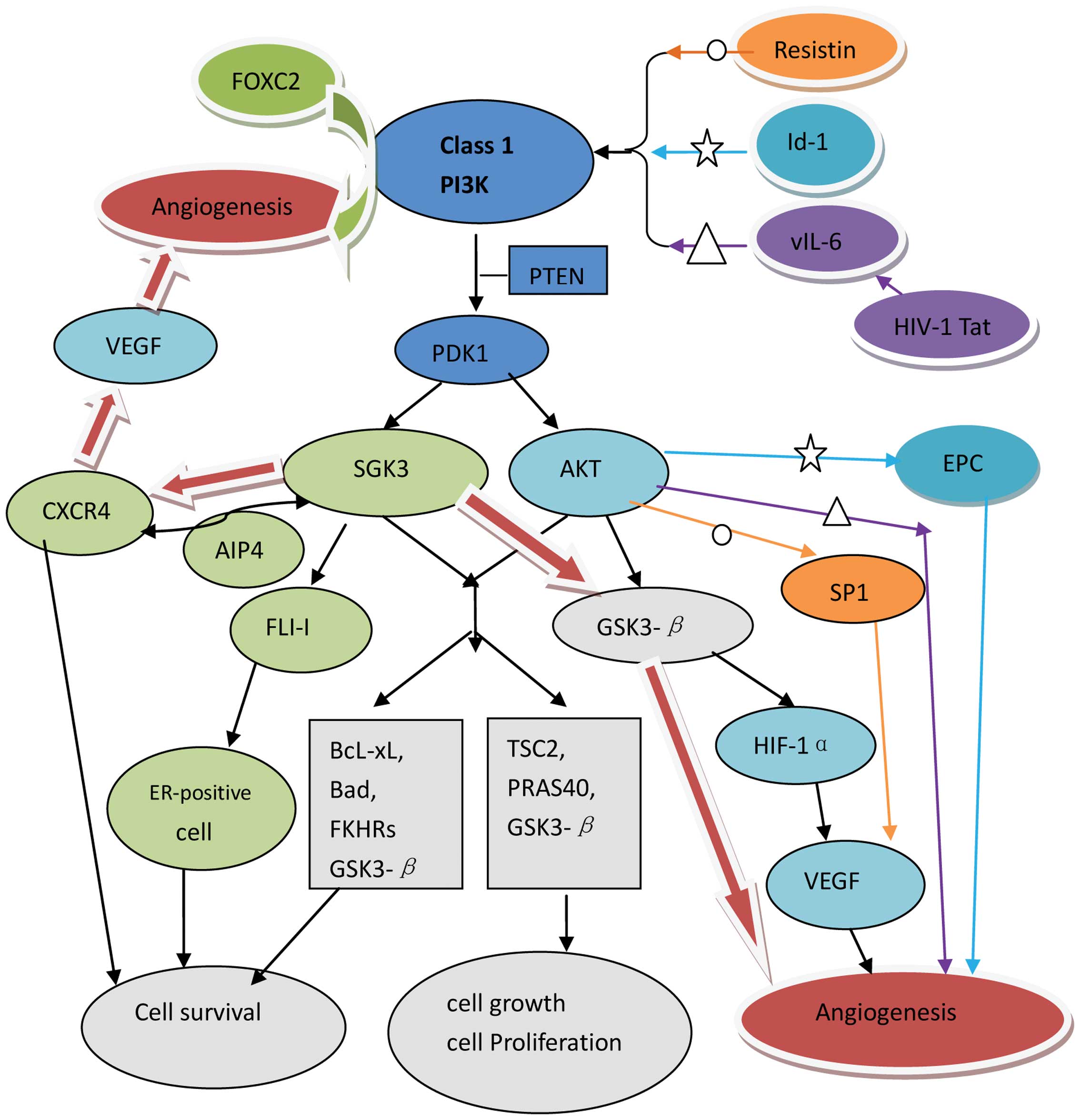|
1
|
Xu J, Liu D, Gill G and Songyang Z:
Regulation of cytokine-independent survival kinase (CISK) by the
Phox homology domain and phosphoinositides. J Cell Biol.
154:699–705. 2001. View Article : Google Scholar : PubMed/NCBI
|
|
2
|
Xu J, Wan M, He Q, et al: SGK3 is
associated with estrogen receptor expression in breast cancer.
Breast Cancer Res Treat. 134:531–541. 2012. View Article : Google Scholar : PubMed/NCBI
|
|
3
|
Liu M, Chen L, Chan TH, et al: Serum and
glucocorticoid kinase 3 at 8q13.1 promotes cell proliferation and
survival in hepatocellular carcinoma. Hepatology. 55:1754–1765.
2012. View Article : Google Scholar : PubMed/NCBI
|
|
4
|
Liu D, Yang X and Songyang Z:
Identification of CISK, a new member of the SGK kinase family that
promotes IL-3-dependent survival. Curr Biol. 10:1233–1236. 2000.
View Article : Google Scholar : PubMed/NCBI
|
|
5
|
Kobayashi T and Cohen P: Activation of
serum- and glucocorticoid-regulated protein kinase by agonists that
activate phosphatidylinositide 3-kinase is mediated by
3-phosphoinositide-dependent protein kinase-1 (PDK1) and PDK2.
Biochem J. 339:319–328. 1999. View Article : Google Scholar : PubMed/NCBI
|
|
6
|
Xu J, Liao L, Qin J, et al: Identification
of Flightless-I as a substrate of the cytokine-independent survival
kinase CISK. J Biol Chem. 284:14377–14385. 2009. View Article : Google Scholar : PubMed/NCBI
|
|
7
|
Buse P, Tran SH, Luther E, et al: Cell
cycle and hormonal control of nuclear-cytoplasmic localization of
the serum- and glucocorticoid-inducible protein kinase, Sgk, in
mammary tumor cells. A novel convergence point of
anti-proliferative and proliferative cell signaling pathways. J
Biol Chem. 274:7253–7263. 1999. View Article : Google Scholar : PubMed/NCBI
|
|
8
|
Caers J, van Valckenborgh E, Menu E, et
al: Unraveling the biology of multiple myeloma disease: Cancer stem
cells, acquired intracellular changes and interactions with the
surrounding micro-environment. Bull Cancer. 95:301–313.
2008.PubMed/NCBI
|
|
9
|
Bruhn MA, Pearson RB, Hannan RD and
Sheppard KE: AKT-independent PI3-K signaling in cancer - emerging
role for SGK3. Cancer Manag Res. 5:281–292. 2013.PubMed/NCBI
|
|
10
|
Ellson CD, Andrews S, Stephens LR and
Hawkins PT: The PX domain: a new phosphoinositide-binding module. J
Cell Sci. 115:1099–1105. 2002.PubMed/NCBI
|
|
11
|
Bruhn MA, Pearson RB, Hannan RD and
Sheppard KE: Second AKTthe rise of SGK in cancer signalling. Growth
Factors. 28:394–408. 2010. View Article : Google Scholar : PubMed/NCBI
|
|
12
|
Slagsvold T, Marchese A, Brech A and
Stenmark H: CISK attenuates degradation of the chemokine receptor
CXCR4 via the ubiquitin ligase AIP4. EMBO J. 25:3738–3749. 2006.
View Article : Google Scholar : PubMed/NCBI
|
|
13
|
Gassmann P, Haier J, Schlüter K, et al:
CXCR4 regulates the early extravasation of metastatic tumor cells
in vivo. Neoplasia. 11:651–661. 2009. View Article : Google Scholar : PubMed/NCBI
|
|
14
|
Müller A, Homey B, Soto H, et al:
Involvement of chemokine receptors in breast cancer metastasis.
Nature. 410:50–56. 2001. View
Article : Google Scholar : PubMed/NCBI
|
|
15
|
Cai W and Chen X: Multimodality molecular
imaging of tumor angiogenesis. J Nucl Med. 49(Suppl 2): 113S–128S.
2008.PubMed/NCBI
|
|
16
|
Ferrara N: VEGF and the quest for tumour
angiogenesis factors. Nat Rev Cancer. 2:795–803. 2002. View Article : Google Scholar : PubMed/NCBI
|
|
17
|
Okumura N, Yoshida H, Kitagishi Y, et al:
PI3K/AKT/PTEN signaling as a molecular target in leukemia
angiogenesis. Adv Hematol. 2012:8430852012.PubMed/NCBI
|
|
18
|
Su Y, Gao L, Teng L, et al: Id1 enhances
human ovarian cancer endothelial progenitor cell angiogenesis via
PI3K/Akt and NF-κB/MMP-2 signaling pathways. J Transl Med.
11:1322013. View Article : Google Scholar : PubMed/NCBI
|
|
19
|
You W, Gao H, Fan L, et al: Foxc2
regulates osteogenesis and angiogenesis of bone marrow mesenchymal
stem cells. BMC Musculoskelet Disord. 14:1992013. View Article : Google Scholar : PubMed/NCBI
|
|
20
|
Zhou F, Xue M, Qin D, et al: HIV-1 Tat
promotes Kaposi's sarcoma-associated herpesvirus (KSHV)
vIL-6-induced angiogenesis and tumorigenesis by regulating
PI3K/PTEN/AKT/GSK-3β signaling pathway. PLoS One. 8:e531452013.
View Article : Google Scholar : PubMed/NCBI
|
|
21
|
Pang L, Zhang Y, Yu Y and Zhang S:
Resistin promotes the expression of vascular endothelial growth
factor in ovary carcinoma cells. Int J Mol Sci. 14:9751–9766. 2013.
View Article : Google Scholar : PubMed/NCBI
|
|
22
|
Koshiba T, Hosotani R, Miyamoto Y, et al:
Expression of stromal cell-derived factor 1 and CXCR4 ligand
receptor system in pancreatic cancer: a possible role for tumor
progression. Clin Cancer Res. 6:3530–3535. 2000.PubMed/NCBI
|
|
23
|
Darash-Yahana M, Pikarsky E, Abramovitch
R, et al: Role of high expression levels of CXCR4 in tumor growth,
vascularization, and metastasis. FASEB J. 18:1240–1242.
2004.PubMed/NCBI
|
|
24
|
Wang J, Wang J, Sun Y, et al: Diverse
signaling pathways through the SDF-1/CXCR4 chemokine axis in
prostate cancer cell lines leads to altered patterns of cytokine
secretion and angiogenesis. Cell Signal. 17:1578–1592. 2005.
View Article : Google Scholar : PubMed/NCBI
|
|
25
|
Dandamudi UB, Ghebremichael M, Sosman JA,
et al: A phase II study of bevacizumab and high-dose interleukin-2
in patients with metastatic renal cell carcinoma: a Cytokine
Working Group (CWG) study. J Immunother. 36:490–495. 2013.
View Article : Google Scholar : PubMed/NCBI
|















